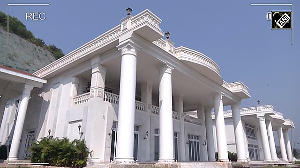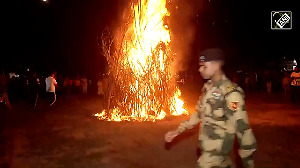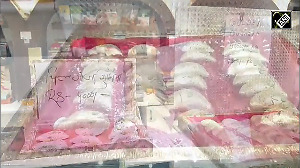
Vice-Admiral S C S Bangara, a specialist in anti-submarine warfare, participated in the attack on Karachi harbour in the 1971 war. During his service with the Indian Navy since 1966, Admiral Bangara has held several crucial appointments including the first deputy chief of Integrated Defence Staff (operations) at the newly established Integrated Defence Staff headquarters that would in the near future be the focal point of Indian military operations.
For now he has a different task as commandant of the National Defence Academy located at Khadakvasala near Pune. The Indian military faces unprecedented challenges thrown up by the global revolution in military affairs and South Asia's nuclear tensions. At the NDA where future officers are groomed these and other issues have already grabbed the new commandant's attention.
A few days after taking over, Admiral Bangara spoke to Chief Correspondent Josy Joseph in his majestic office at the Sudan Block of the NDA's sprawling, unsoiled campus about his attempt to put the limelight on training and discipline at the Academy.
The armed forces suffer from a visible shortage of officers, over 12,000 or so in the army itself. There is also concern in various quarters about the falling quality of new officer recruits. How are you going to address these issues?
There are two aspects to your question. First, the quantity, numbers. We have never had a shortage of people coming into the NDA because a large number -- tens of thousands -- of people attempt the NDA examination. The last term exceeded the prescribed numbers. Quantity wise, there has never been a major issue.
Now we come to the quality issue. It is a fact none of the crème of our youth opts for the military. Therefore, we are getting material from the middle group. They manage to qualify for the UPSC [Union Public Service Commission] examination. The question we need to ask ourselves is whether the UPSC threshhold is correct because we have today a bright lot of youngsters attempting a lot of competitive examinations such as CAT, TOEFL, SAT etc. They are capable of producing much higher standards than the NDA examination or the UPSC examinations.
I am investigating as a first step to see the quality of the UPSC examination; if it needs revision, then to get it done. In other words, the filtration process could be much tougher because we do not have problems with quantity.
So you are taking this up in New Delhi with the UPSC?
I have just taken over and I am taking this up with the Chiefs of Staff Committee and whoever has to deal with UPSC subjects.
Despite the global revolution in military affairs and hi-tech gizmos invading battlefields, our battles remain brutally physical, whether it is in Kashmir or the Northeast. How are you coping with the twin challenges of producing an extremely intelligent officer who at the same time is fit to stand the tough tests of daily war?
One thing has stood the test of time in our environment. Despite an increase in the intellectual content of a cadet's syllabi, the physical ability to withstand the rigours of present day warfare cannot be diluted at any cost. Therefore, the physical attributes that we expect from the young men who come here have not been diluted. The debate often posed is if you need so much of physical fitness standards in today's or tomorrow's warfare scenario which may be smart weapons, attacking from very great distances without hand-to-hand combat etc. That has not been proved by any of the recent skirmishes. Hence, we have not diluted the physical standards.
We however have a problem. That is the young man who comes into the NDA, between the ages of 16.5 and 17.5 years, is not physically as powerful as the previous generation because he spends a lot of his formative years preparing for examinations and doing sedentary jobs, sitting on a chair most of the time. So physically he does not involve in any outdoor activity before coming into the NDA mostly. So we have young boys with increasing cases of stress fracture, which was not common in the past. His body is not prepared to take the rigours of training in the very first semester or so.
To address this particular area we have engaged specialists from sports medicine who have suggested the type of surfaces on which cross-country can be run, the type of footwear to be worn, and to toughen up the cadets in a scientific manner so that stress fractures do not occur. At no stage are the physical standards compromised.
Are you implementing them already? What are the initial results?
Yes, [it has] just commenced. For example the cross-country route has been changed, not to be on a very hard surface. Distance is the same, but we are reducing the element of stress fracture by not letting them run long on hard surfaces. After all, the endurance is being tested, but we are getting lesser cases of stress fracture. We are trying to get better shoes. It is a question of cost and government sanction. We are working on it.
An increasing number of young officers are found to acutely lack awareness of larger issues around them, despite the modern military demand that an officer be aware of diplomacy, finance and other aspects of governance that affect his strategy, wars and weapons. How are you addressing it?
I would go back to the educational system currently available in India. It is my impression that a number of subjects necessary for the overall growth of one's mind have been now by and large deleted from the syllabus at our schools. I am even told English grammar has been removed from the syllabus of central schools. So there is a problem of communication skills in whatever languages you chose to use that directly affects the ability of officers to read and to express themselves. English continues to be the link language because of our increased interaction globally and also to keep pace with technical advancements.
There is a great dichotomy here on whether we should enable the officer to understand by reading from publications and what should be his take-off level at the time of induction. And I would say the take-off level at the time of induction in all these aspects is much lower today than what it was in the past. We have to therefore attack the education system of India if I have to get the right material into the NDA. It cannot be solved on a full-time basis only by this Academy because we will have very little time to get him his degree, give him the rest of the skills.
I am sure, despite being aware of these shortcomings, you are not allowing time to just pass by. There is the IT revolution happening, the information explosion.
At the moment it cannot be rectified in situ. We try with more interactions. For example every cadet is made to read a newspaper by giving him a personal copy which did not exist earlier. This started a couple of years ago. So he is supposed to be current on the news when he comes in the morning for his first session. Every place of accommodation now in the squadrons has got a computer room where there are six to eight PCs available, and we are in the process of getting Internet connections where they can access news and any other interesting data.
The problem with Pune is we do not have the infrastructure to provide the right Internet connection of the right quality and speed for people who access and read. Of course, there is also a financial angle to the number of connections you can provide. We are working on government sanctions etc. As of now there is a lot more access to electronic and PC-based media than it was two years ago.
There is a great deal of ignorance among the public about military institutions such as yours. The quality of life you provide, the kind of personality grooming and exposure cadets get. And that ignorance is a major contributing factor for the best youngsters opting out of the NDA. What are you doing about it? There is at least one assessment in Delhi, by the government's agencies, that warn by 2012, the armed forces may not find even a single youngster fit to be an officer in the modern battlefield.
You are absolutely right. I do not think people of this country know of the facilities this institution offers in terms of mental development and physical aspects of training. We are in the process of launching a documentary on the NDA. My intention is to flood schools, both in urban and rural areas, with this material, a bird's eye view of NDA activities. We will give it on CDs for people to screen before children on the threshhold age before they make their career choices. A lot more people should be aware of the adventures and kind of life a young cadet leads.
The first battle is awareness. We have to cater with the help of the electronic media, print media and also Internet such as your organisation to bring this awareness to every household so that the young man of today has the choice.
Secondly, you talked about quality. I am not unduly alarmed because I do see India having a huge human resource from which various people can select not only their own professions, also those selecting them have their own choices. In this area I think with increased Internet availability and computerisation people living in rural areas would have access to information that enable them to take a decision. And if that happens we will not have a dearth of people joining the armed forces.
There is also a perceptible shift in the class of students coming in. In the first few decades the NDA had cadets from aristocratic families. Today their progeny opt for cushy lives of the corporate world. So you have cadets mostly from middle class or lower middle class families. Is that of any concern to you?
Yes, you are right. We have middle class and below, and more so in the lower middle class families coming into the NDA. But is it unique to India? No, my answer is it is not unique to India. This is the global trend. People are opting for softer ways of leading a life, with little more monetary benefits than a hard and harsh life. This is being partially addressed by the perks the armed forces make available to the officer cadre, along with the camaraderie and other security aspects that go along in your family life.
I have a son in the corporate world who at a young age has reached a fairly senior position in the corporate world. He does not have the same quality of life despite his income being higher than that of a young officer in the armed forces. Not only are the officer's working hours cut out, he can also have a family life as well as access to a number of sports facilities which improves the quality of life. So it is a question of monetary benefits alone versus quality of life.
The Indian armed forces are straddled with innumerable ceremonies and practices, mostly passed on by the British Empire. Are you trying to cut through some of them and make the forces much more modern?
The answer is to be more pragmatic in today's India. You are right in saying many of the old practices are of colonial nature, and yet the emphasis is on tradition. Traditions are a necessary part of military life. Without traditions military life loses a lot of its importance. So we have to balance between the traditional values left behind by the colonial power and the rapid changes taking place in the socio-economic sphere of India.
Many of those changes have automatically been incorporated without much fuss. With an increasing number of cadets coming from rural areas, many of them are bound to undergo changes as we go along. Unless the armed forces are pragmatic and realistic in this, there is bound to be a friction with the old values and change in attitude.
Even a decade ago, the NDA campus used to have a variety of cadets from around the world. Now it has shrunk to cadets from a few countries. There is also a feeling the institution itself has slipped down from its earlier standing as a foremost military establishment of the world. Why?
There are two reasons why it has happened. Firstly, as you said, India economically could not keep pace with our less economically developed neighbours with the result our infrastructure suffered. This needs to be addressed over a period of time.
Therefore, we could not keep pace with the international quality facilities readily available in many neighbouring countries that are economically more forward looking, Southeast Asia etc.
The second reason is we helped many of these countries set up their academies. Therefore, many countries find it necessary to train their officers initially before they send them out for advanced training. So, you will find more foreign officers coming to our technical military institutions, the National Defence College, Staff College and our specialised institutions such as in the navy at Venduruthy where there are many more foreigners. They are coming in because in that area we have by and large kept pace with our expertise.
Cadets from which countries presently train with you?
We have countries like Palestine, Bhutan, Sri Lanka, Nepal and so on.
There is growing interaction between militaries around the world. They are meeting mostly not in the battlefield, but during joint training, exercises and on the sports field. How is the NDA doing its bit?
We have recently sent a cadet to Thailand to look at the Thai academy which has a very strong American influence. We had an American cadet from West Point who came and spent a few days in India studying our training patterns. We have sent one cadet to the US basically to take part in polo events. However, he was given access to some training facilities. This has started in a small way, and I can see it has a potential to grow.
What are the plans for improving such interactions?
This is being done at the ministry of defence and service headquarters.
You are one of the rare NDA commandants who is not a NDA product. Is it a disadvantage? Does it gives you a fresh perspective of the institution?
Firstly, I must correct you, from 1949 when the JSW (Joint Services Wing) was commissioned till 1982, when approximately the first JSW trained officer came in command, there were only non-NDA officers running the show. Subsequently, the first NDA officer who took over as commandant was only in 1991. After that there have been many ex-NDA alumni [as commandants]. Maybe after that I am one of the two not from the NDA. But I do not know any such consideration when they made the decision (to appoint me).
I think it gives me a tremendous opportunity, along with my deputy commandant who is from the NDA and other staff from the NDA, to use our expertise to better the NDA.






 © 2025
© 2025